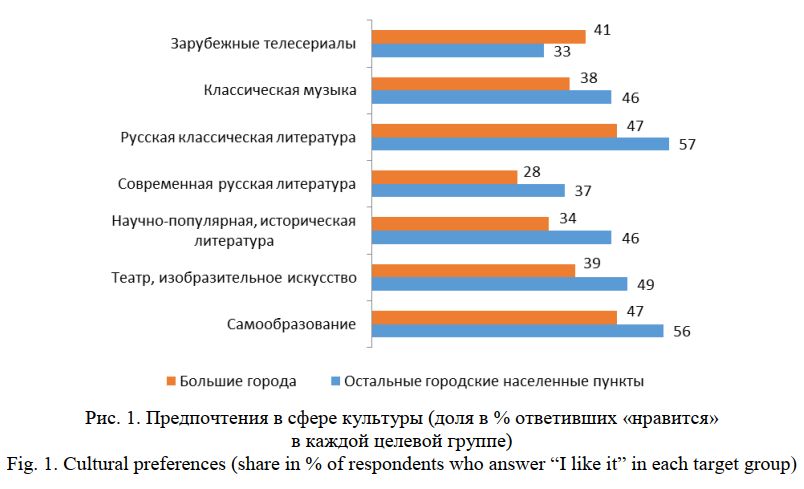Urban community lifestyle as a resource for adaptation to uncertainty of the environment
The article substantiates the relevance of the study of problems of adaptation to the conditions of uncertainty in the urban environment. The research problem is to identify the specific components of the urban community’s lifestyle in times of crisis and to assess the significance of various indicators of these components for adaptation to uncertainty. Data analysis from the Russian nationwide monitoring, conducted during the peak of the crisis – a period of uncertainty at the macro level, has revealed a low level of adaptability of respondents from urban settlements with a population from 100,000 to 250,000, which are commonly referred to as “big cities”. A comparative analysis of urban community’s lifestyle components from big and all other cities has allowed us to draw the following conclusions. The lifestyle of the urban settlement community can be viewed as a complex indicator of the “resourcefulness” of adaptation to environmental uncertainty, including those caused by the crisis at a higher structural level. In general, the data allows us to characterize the adaptive “resourcefulness” of respondents’ lifestyle from big cities as dual. On the one hand, a certain conservatism, “stagnation” contributes to psychological adaptation to the crisis period, on the other hand, the uncertainty in our everyday life requires reflection and recognition of the changed social reality, and, secondly, active increasing of the adaptation potential. The adjustment of lifestyle is the mechanism of this complex adaptation process through the increase of subjectivity, reflexivity, and the activity-motivational component of lifestyle.
Information for citation: Mozgovaya, A. V. and Shlykova E. V. (2019), “Urban community lifestyle as a resource for adaptation to uncertainty of the environment”, Research Result. Sociologyandmanagement, 5 (1), 52-69, DOI: 10.18413/2408-9338-2019-5-1-0-5
Figures





























While nobody left any comments to this publication.
You can be first.
Gritsenko, G. D. (2014), “Social wellbeing and social adaptation: the correlation of the notions”, Universum: Obshchestvennye nauki, 6 (7), available at: http://7universum.com/ru/social/archive/item/1419 (Accessed 28 January 2019). (In Russian).
The demographic encyclopedia, (2017), in Tkachenko, A. A., Anoshkin, A. V. and Denisenko, M. B. (ed.), Entsiklopediya, Moscow, Russia. (In Russian).
Kozyreva, P. M. (2011), Trust and its resources in modern Russia, Institut sotsiologii RAN, Moscow, Russia. (In Russian).
Kozyreva, P. M. (2004), The processes of adaptation and evolution of social well-being of Russians at the turn of XX-XXI centuries, Centr obshchechelovecheskih tsennostey, Moscow, Russia. (In Russian).
Kozyreva, P. M. and Smirnov, A. I. (2018), “Scale of Distribution and Amount of Remuneration for Medical Services”, Sotsiologicheskaya nauka i sotsial'naya praktika, (3), 26-42. (In Russian).
Kozyreva, P. M. and Smirnov, A. I. (2017), “Business and the Population: A Lack of Trust – Reasons and Consequences”, Polis. Politicheskie issledovaniya, (1), 53-69. (In Russian).
Mozgovaya, A. V. (2008), “Sociology and risk management”, in Mozgovaya, A. V. (ed.) Sociological coordinates of risk, Izdatel'stvo Instituta sotsiologii RAN, Moscow, Russia, 7-18. (In Russian).
Mozgovaya, A. V. and Shlykova, E. V. (2014), “Social resources and adaptation to risk: the choice of strategy (by the example of the social community in the situation of particular risk)”, Sotsiologicheskaya nauka i sotsial'naya praktika, (4), 25-49. (In Russian).
Zubok, Yu. A., Chuprov, V. I., Shapovalova, I. S. (2016), Risks of transforming habitat: the problem of research and management: a monograph, in Zubok, Yu. A. (ed.), Epicentr, Belgorod, Russia. (In Russian).
Russian Society and Challenges of The Time. Book Two (2015), in Gorshkov, M. K. and Petuhov, V. V. (ed.), Ves' Mir, Moscow, Russia. (In Russian).
Tatarova, G. G. (1998), Methodology of data analysis in sociology, Strategiya, Moscow, Russia. (In Russian).
Shlykova, E. V. (2017), “Profile of adaptive social well-being of the population in the conditions imposed on risk”, Izvestiya TulGU. Gumanitarnyenauki, 1, 114-126. (InRussian).